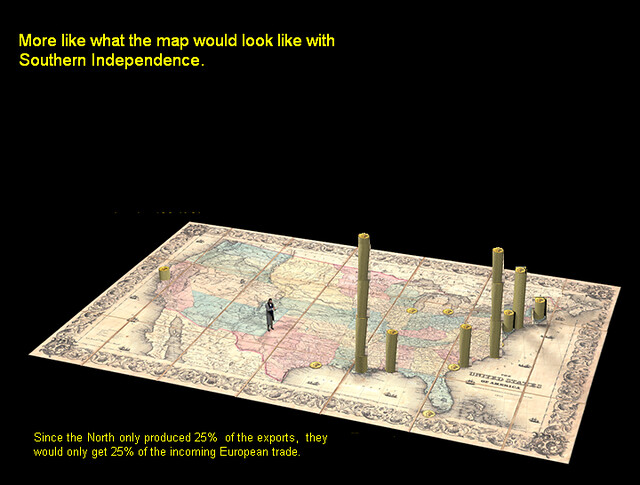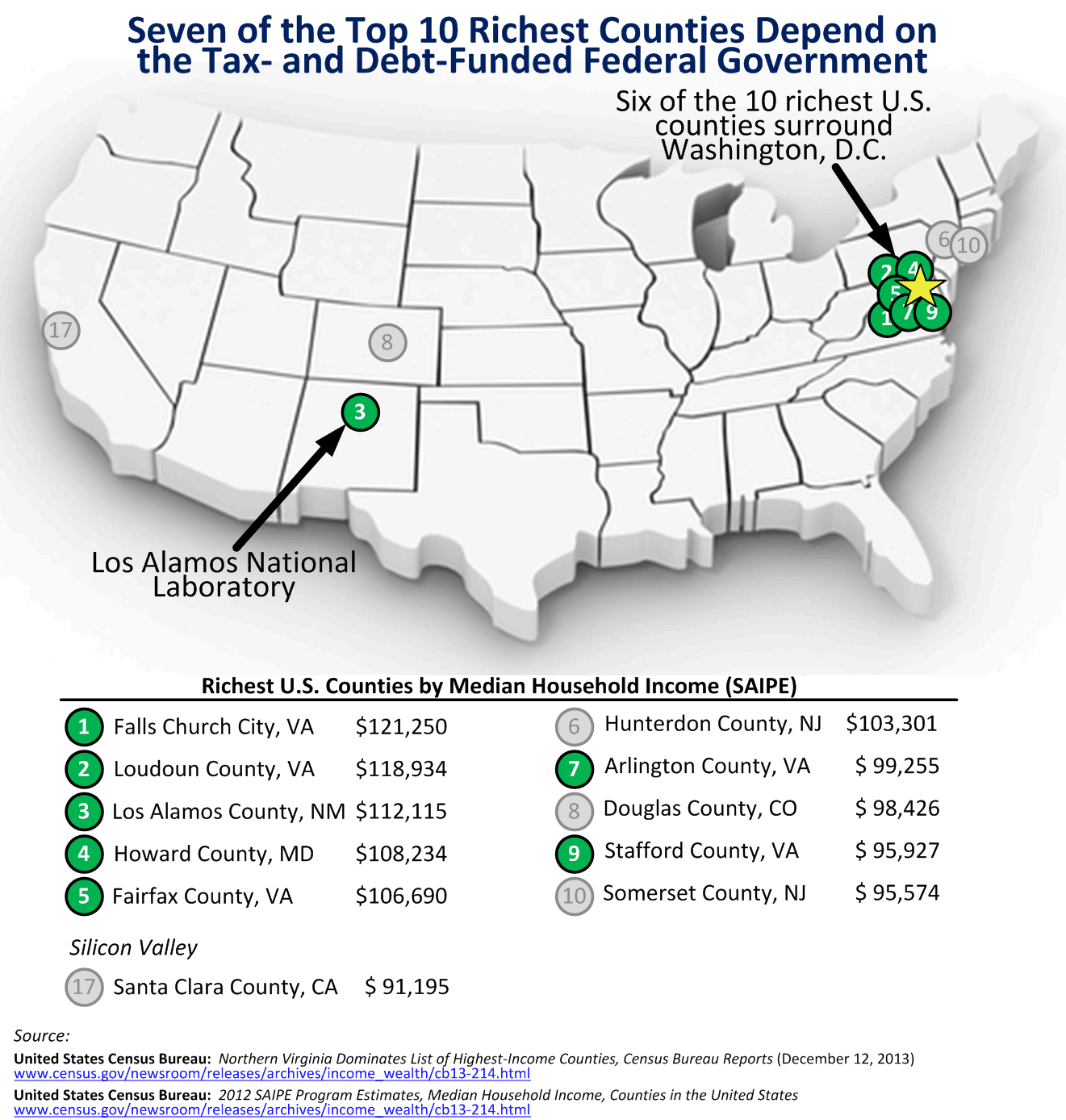To: FLT-bird; SoCal Pubbie; rockrr; x; DiogenesLamp
FLT-bird:
"Tariffs are paid for by the owners of the goods.
The goods brought back were sold on the open market to anybody.
They could be undercut on price though once they had had to pay the high tariffs and they would lose market share." When you think about it, this somewhat explains why FLT-bird differs from DiogenesLamp on the role of those evil "Northeastern power brokers".
Where DiogenesLamp makes them the focus of his irrational hatreds, FLT-bird doesn't mention them, instead focusing on the alleged fact that Southerners themselves owned the imported goods, and therefore actually paid the tariffs on them.
It's an important distinction since if "New Yorkers" paid all the tariffs, as DiogenesLamp implies, then "what's the beef" from Southerners?
But if, instead, Southern planters themselves owned the goods imported through New York, then they must pay the tariff themselves and so have standing to complain.
Which is more correct?
Well, DiogenesLamp blames "New York power brokers" for virtually everything and that is clearly absurd.
But how much of America's imports in, say, 1860 were owned by the very cotton planters who exported their produce to Europe?
My guess is: very little.
And the reason is, when planters harvested & prepared their crops, they moved the bales to a rail siding or steamboat landing.
Merchants riding the train or steamboat would offer the planter a price for his cotton bales, which the planter may accept or wait for the next train-steamboat in hopes of a better price.
The merchants then move the cotton to port, export it and, on return fill the ships' cargo holds with European products.
So who were these merchants, New Yorkers? Maybe.
Southerners? Maybe
Foreigners? Very likely, representatives of European importers there to make certain their companies get the quantities & qualities needed.
Point is: once the cotton leaves the rail siding or steamboat landing, our Southern planter has his money -- that's his payday -- and ownership transfers to agents representing ultimate customers, agents who then also refill the ships' cargo holds with European imports for their return trip.
So I'm thinking DiogenesLamp stumbled slightly closer to truth on this, though both Lost Causers are distorting actual history for their own propaganda purposes.
Agree? Disagree?


![]()
466 posted on
04/24/2018 9:26:49 AM PDT by
BroJoeK
(a little historical perspective...)
To: BroJoeK
I am doing research to find specific detail as to how cotton was sold and distributed, and how imports returned to the US. I have reached out to two historians and I’m also trying to get their books. What I’ve found so far are two things.
One, the whole system was more complex than what’s described in the Southron lament. It was hardly “Southerners planted and Northerners profited.”
Two, factoring houses, already mentioned by others on this thread, were a huge part of the process.
The complexity arises because while there were usual and normal practices, different planters worked differently. Some wanted to follow the cotton through the sale. Others wanted the factor to act with complete autonomy to make the best deal. Others split the difference, giving the factor the lowest price they’d take. Even in that case, the factor might disobey that dictate if he felt he had to.
Further complicating matters is that many factor houses were Southern companies, others New York firms, and still others were American agents of British brokers and importers. In addition American and British banks invested in American businesses while not being directly involved.
Now, as you say, so far as I can tell once the deal was done the plantation owner had his money (depending on terms) and had no interest in importing. What I’ve read is that rich Southerners reinvested profits in more slaves and more land. The idea that the seller arranged shipping and not the buyer or exporter, and was forced to book round trip voyages, seems absurd to me. The market was ever changing and trends came and went, so a shipping company who wanted to charge the highest rates had to be flexible. Having your ships tied up both ways makes no sense.
That’s not to say that those profiting from crops in the South did not also participate in importing. But I don’t see a direct connection.
Oh, by the way, Louisiana politicians were all for tariffs when the duties were levied in sugar!
To: BroJoeK
So I'm thinking DiogenesLamp stumbled slightly closer to truth on this, though both Lost Causers are distorting actual history for their own propaganda purposes.
475 posted on
04/24/2018 10:55:19 AM PDT by
DiogenesLamp
("of parents owing allegiance to no other sovereignty.")
To: BroJoeK
But if, instead, Southern planters themselves owned the goods imported through New York, then they must pay the tariff themselves and so have standing to complain.
478 posted on
04/24/2018 11:20:53 AM PDT by
DiogenesLamp
("of parents owing allegiance to no other sovereignty.")
To: BroJoeK
Well, DiogenesLamp blames "New York power brokers" for virtually everything and that is clearly absurd. Not just New York. I just say "New York" as a shorthand. It's actually the corridor of power that stretches from Washington DC, through New York, and up to Boston. But "New York" is just a simplified way of saying it. I've explained what I mean several times, but you keep pretending to not understand what I mean when I say "New York."
"Deep State", "Establishment", and "Crony Capitalists" also work.

480 posted on
04/24/2018 11:33:41 AM PDT by
DiogenesLamp
("of parents owing allegiance to no other sovereignty.")
To: BroJoeK
BroJoeK But how much of America’s imports in, say, 1860 were owned by the very cotton planters who exported their produce to Europe?
My guess is: very little.
And the reason is, when planters harvested & prepared their crops, they moved the bales to a rail siding or steamboat landing.
Merchants riding the train or steamboat would offer the planter a price for his cotton bales, which the planter may accept or wait for the next train-steamboat in hopes of a better price.
The merchants then move the cotton to port, export it and, on return fill the ships’ cargo holds with European products.
So who were these merchants, New Yorkers? Maybe.
Southerners? Maybe
Foreigners? Very likely, representatives of European importers there to make certain their companies get the quantities & qualities needed.
Point is: once the cotton leaves the rail siding or steamboat landing, our Southern planter has his money — that’s his payday — and ownership transfers to agents representing ultimate customers, agents who then also refill the ships’ cargo holds with European imports for their return trip.
So I’m thinking DiogenesLamp stumbled slightly closer to truth on this, though both Lost Causers are distorting actual history for their own propaganda purposes.
Agree? Disagree?
It will depend on the the Seller of the Cotton. Some were large Planters who acted as wholesalers buying up the cotton produced by yeoman farmers around them for a percentage and putting it together with their own, some were strictly wholesalers (”Factors” as they were called then).
Whether the Southern owned the cotton all the way through direct sale to say Lancashire mills OR whether he sold on to a Factor at the docks, the end result of the tariffs would be the same.
If the voyage of the ship and the costs associated with it could not be defrayed nearly as well by imported manufactured goods due to the tariffs, then the price he is going to be paid per bail of cotton is going to go down. That is money directly out of his pocket.
In addition to that, thanks to those high tariffs, domestic manufacturers can increase their prices so whether he buys an imported manufactured good that has been tariffed or whether he buys a domestic manufactured good, he is going to have to pay a higher price one way or the other - more money out of his pocket.
Notice how this affects the yeoman farmer who devoted say 10 of his 40 acres to cotton in order to raise money to buy the things he could not produce as well as Plantations like Tara in GWTW. Money out of their pockets two ways. They all feel it. Slavery only concerns that plantation owner. The tariff concerns everybody.
But of course its not surprising to see the PC Revisionists try to just scream “slavery slavery slavery” at every turn while denying how the Northern states were voting themselves other people’s money....how corporate fatcats had politicians in their pocket and manipulated government policy to increase their profits.
532 posted on
04/25/2018 12:42:16 AM PDT by
FLT-bird
(..)
FreeRepublic.com is powered by software copyright 2000-2008 John Robinson




